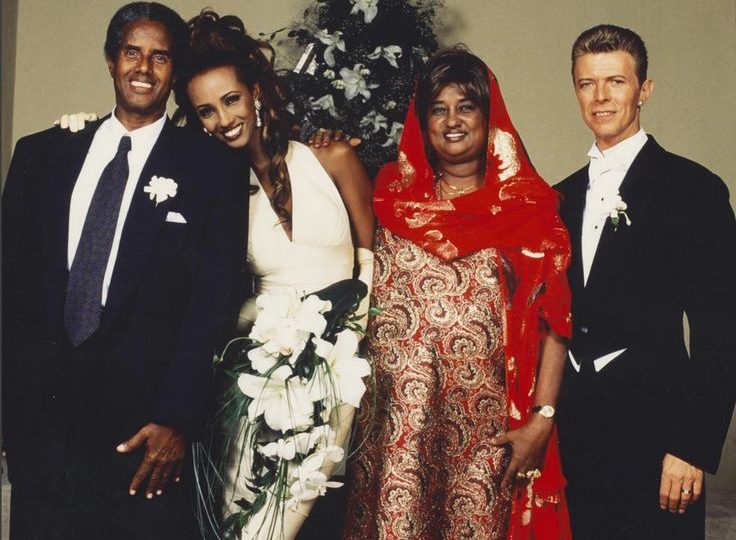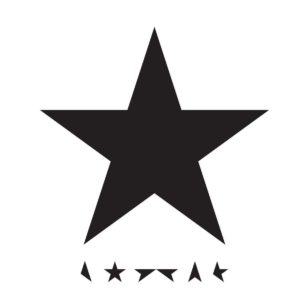
Iman Mohamed Abdulmajid & Her 26 Years With Bowie: Black, Muslim, Not Existent In The Narrative
I’m always my father’s daughter, and I’ll always be a Somali girl. And that is the pride that you put in yourself, the pride of yourself and never lowering your worth. You don’t have to lower yourself. They’ll meet you where you stand.
Iman
(Originally published on April 8, 2021, this article was the most popular one in 2021.)
Bowie died on January 10, 2016, at age 69 from liver cancer. With his passing and the release of his last album Blackstar two days prior to his death, an ongoing Bowie revival has been kicked off, flanked by a flood of book publications dealing with every aspects of the life and career of the Starchild. Some of these books are good, some mediocre, others simply bad, but all of them have one thing in common: they pay criminally little attention or just downright ignore David Bowie’s partner and wife of 26 years, Iman Mohamed Abdulmajid.
One could simply label it misogynist, if it weren’t for the long passages about Bowie’s first wife Angie Bowie in every single one of these publications. This was a toxic youth sin which ended badly, with Bowie taking full custody of their son Duncan and never talking to Angela Bowie again after the divorce. 49-year-old Duncan refuses to see or talk to his biological mother since 30 years. Mary Angela Barnett for her part even 40 years after their divorce did not give up on her ex-husband’s famous surname and went on to discredit the enormously private artist during crazy-old-lady ramblings in her attempt of a career in reality shows such as „Celebrity Big Brother“. It was during her disgraceful participation in that degenerate surveillance show when she learned about David Bowie’s death in front of cameras, but decided to remain in the show.
At this point it should be noted in which dignified and loyal manner Iman preserves the legacy of her husband David after he is gone. Since Bowie died, sudden for the public which had no idea of his illness, Iman as always resisted the spotlight and eschewed any public discourse on the subject, except for the single line “The struggle is real, but so is God”. It is a behaviour which makes clear of how much part she continues to be in the mystery and elusiveness of Bowie.
Yves Saint Laurent was among the first fashion designers to embrace black models on the runway, saying “My dream woman is Iman… Perfection. Her face. Her body.“ Bowie met his dream woman in 1990, and their meeting would seem like an interracial love movie script that’s heavy on symbolism, if it weren’t cosmically true: „David Bowie pulled up to Teddy Antolin’s dinner party in Los Angeles in a white Mustang, wearing head-to-toe white denim. Iman, who had recently retired from modeling, arrived at the same party in a black Mercedes, decked out in head-to-toe black leather.“ Not short of the world’s most beautiful women throwing himself at the attractive super star, 43-year-old Bowie knew exactly what he wanted back then and therefore had been almost single for a decade because he refused to settle for anything less than “the one“: “My attraction to her was immediate and all-encompassing, I couldn’t sleep for the excitement of our first date. That she would be my wife, in my head, was a done deal. I’d never gone after anything … with such passion in all my life. I just knew she was the one.”
Teddy Antolin’s dinner party in Los Angeles in a white Mustang, wearing head-to-toe white denim. Iman, who had recently retired from modeling, arrived at the same party in a black Mercedes, decked out in head-to-toe black leather.“ Not short of the world’s most beautiful women throwing himself at the attractive super star, 43-year-old Bowie knew exactly what he wanted back then and therefore had been almost single for a decade because he refused to settle for anything less than “the one“: “My attraction to her was immediate and all-encompassing, I couldn’t sleep for the excitement of our first date. That she would be my wife, in my head, was a done deal. I’d never gone after anything … with such passion in all my life. I just knew she was the one.”
He was right. The couple married two years later, had a daughter together, and remained happily together for 26 years until the end of Bowie’s days. Bowie lovingly talked about the multi-cultural environment that their home was, with a 5-language speaking wife who would talk in Somali to her relatives when he would not understand a single word- it is absolutely lovely. It is strange why the dignified and sophisticated Iman was never celebrated for the immensely positive influence she had on David Bowie, not only in artistic terms with his return to more experimental music after the Let’s Dance and Tin Machine years, resulting in some of his best albums of his career (Outside, Heathen, The Next Day, Blackstar), but also because of her impact on his destructive lifestyle. Meeting Iman prompted Bowie to sober up. Teddy Antolin remembers the aftermath of the night the couple met at his party, “He decided, ‘I met her, I’m changing my life, I’ve got to impress this woman and step up’. He did everything to change any kind of bad habits he had and it was remarkable because David never had a drink after that or anything.” It remains unclear why Iman was never celebrated as an angel in a society obsessed with resurrection stories, maybe it is because she doesn’t have the color of an angel. Or maybe in her case this influence is something rather bad because like every good Muslim refugee, Iman must certainly have islamized Bowie on her jihad in the occident?
„I think often the West does not understand the history and the privilege of wearing a hijab. They always think of oppression.“ Iman (which means “faith / belief” in Islam) is not just a Muslim on paper, but a faithful woman who always took great pride in her Somali roots and in being a Muslim woman. In David Bowie: The Oral History (2018), the British author Hanif Kureishi recalls a dinner at which they all sat together and the topic of Salman Rushdie and his controversial book The Satanic Verses was raised. In what he recalls, Iman stood out with a complex knowledge of the Quran and matters of Muslim theology as opposed to the reflexive liberal advocation for Rushdie and condemnation of the backlash against him. Iman didn’t defend or support the fatwa that was declared on Rushdie by Iran’s Ayatollah Khomeini, but passionately talked about what was wrong about what Rushdie did. There were no marital fights that night but Bowie seemed to agree- this was Bowie’s wife and soulmate. Kureishi recalls a few such incidents and ponders over the same question as me, why Iman and her black and Muslim identity play no role in all the assessments and narratives on Bowie and his music.
Another surprise in David Bowie: The Oral History was the revelation of Bowie’s strong sexuality and all the talk about the big crown jewels between his legs. The man who is preferably being portrayed as an androgynous asexual with no sex organ was actually a lustful lover with an insatiable sex drive, a lover who found an ideal playmate in Iman, theirs was a very sexual relationship. Androgynous Angie and her never-ending, repetitive talk about Bowie’s alleged bi-sexual episodes fit in the false legend, episodes which in their vague narrative never come out of an experimental phase. It is beyond strange that this almost asexual narrative around Bowie was built, one in which he surrounds himself with androgynous women, complete with clumsy visions of a juvenile bi-sexuality, when in reality he lived like a lustful caliph in 1001 Nights until he settled for his ideal woman. In this regard, the public Bowie has never been moved out of the Ziggy Stardust era, and regarding his last 26 years, the question arises whether the racist stereotype of the black woman as evil and irresistible, “exotic” seductress making the white man sin played a role in this regressive arrest. Emasculation was chosen over the possibility of true love and sex.
In 1992, Bowie and Iman arrived in LA the day the riots started in response to the acquittal of four white Los Angeles policemen for using extensive force and beating in the arrest of the African American Rodney King. The couple hid in a hotel room and had sex for days while the city around them was set on fire. Bowie talked about how during these intimate moments in this apocalyptic setting, he looked into his Somali wife’s eyes and wondered if he really understood her blackness and the part of her that must have shared the black protesters’ anger, and if any of this anger could be directed at him. It is an astonishing reflection on the experience of “white guilt”, which he put into the song “Black Tie, White Noise”, his most overt statement on the issue of race. In the song, Bowie wonders why Iman would not just kill him, the white man, then reassures himself that Iman won’t kill him because of the one force that overcomes everything: love. “I look into your eyes and I know you won’t kill me / And I turn my back and I know you won’t kill me / You won’t kill me / You won’t kill me, no / But I wonder why / Yes, I wonder why sometimes“
It is surreal and hard to swallow that such a selectively ignorant and racist legend could ever be built around a star with Bowie’s format and magnitude. Talk about culture imperialism. Since Bowie released his swan song in 2016, countless articles and threats have been dedicated to the mysteries and hidden meanings of Blackstar and especially its title track, and exploring the true message of this final testament has become a form of science in its own right. The interpretations go in many wild directions, with many of them leaning into the occult. But for full 5 years which have passed since Blackstar‘s release, not one of these theories has considered or mentioned one rather obvious possibility: that Blackstar might be about Iman, and the African ummah.
by Saliha Enzenauer
At the centre of it all, at the centre of it all
Your eyes, your eyes
…
I see right, so wide, so open-hearted pain
…
How many times does an angel fall?
How many people lie instead of talking tall?
He trod on sacred ground, he cried loud into the crowd
…
I can’t answer why (I’m a blackstar)
Just go with me (I’m not a filmstar)
Imma take you home (I’m a blackstar)
…
(I’m a blackstar, I’m a blackstar, I’m not a gangstar)
I’m a blackstar, I’m a blackstar, I’m not a gangstar
…
At the centre of it all, your eyes, your eyes.
